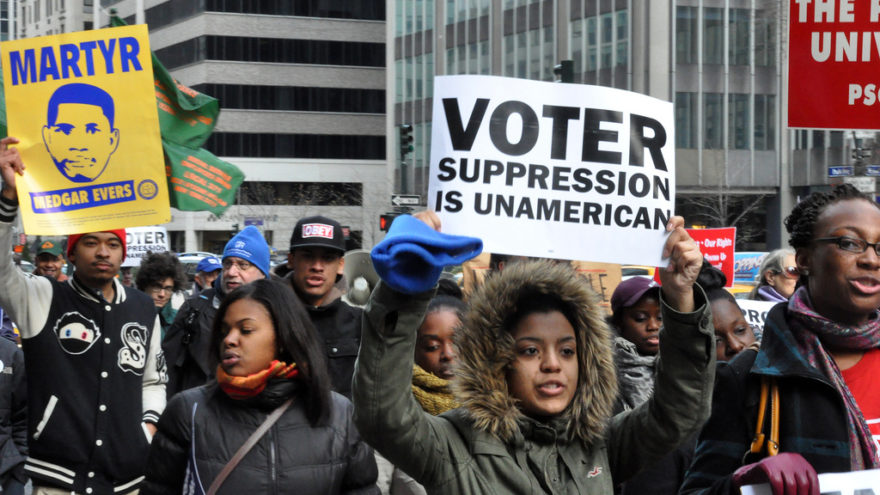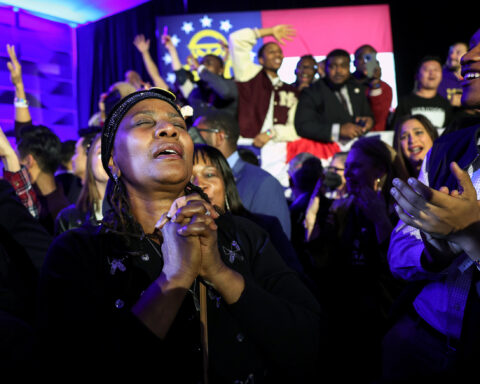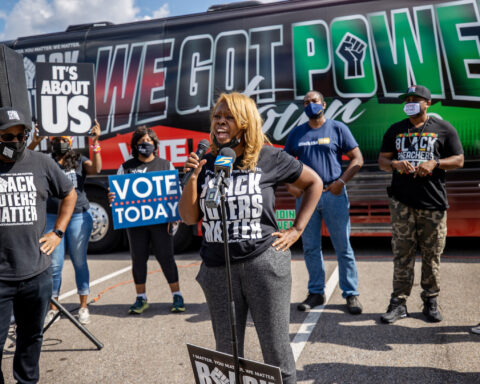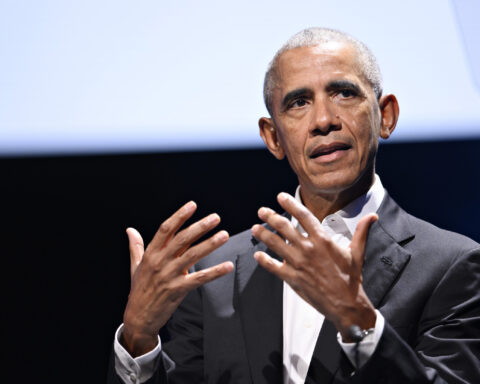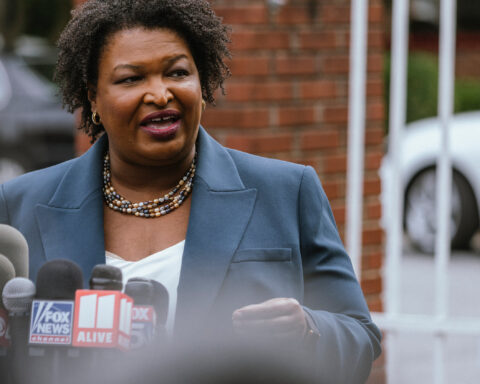When Patricia Dossie left her senior housing apartment west of downtown Atlanta to vote on Tuesday, she was certain of her destination: a recreation center about 6 miles away.
“I’ve been voting there for years,” the 73-year-old said. But she and two of her neighbors found they were no longer on the voting list at that precinct. And because Georgia’s new election law bars most voters from casting ballots outside their home polling places, the elderly trio made yet another trek — this time, to the right polling place, at a small neighborhood library, to vote in the city’s mayoral election.
Dossie, a Democrat, said she has no idea how to look up her polling place online. And she views the changes to state law as Republican retribution for Joe Biden’s victory there last year, when he became the first Democrat to win Georgia in nearly three decades. “So many came out for Biden, and I feel this is their way to keep us from voting,” she said. “It’s not right.”
In Georgia, voters like Dossie learned firsthand about some of the effects of new voting restrictions on Tuesday as they cast ballots in the first election since the law passed in March.
Tuesday’s low-key, low-turnout municipal election offered voting rights activists a chance to try out new tactics as they look for ways to navigate the law’s restrictions ahead of next year’s high-stakes battles and the 2024 presidential contest. Next year, Georgians will pick a governor and decide the future of the seat now held by Democratic Sen. Raphael Warnock, potentially determining which party controls the US Senate after the midterm elections.
“We’re testing out the whole process,” said Stephanie Ali, policy director of the New Georgia Project, one voting advocacy group, “because when this turnout is multiplied tenfold, these issues are going to become much bigger.”
Tuesday’s election also marked a test for the people who run local elections. Another test of Fulton County’s system is quickly approaching: a runoff to pick Atlanta’s next mayor is scheduled for November 30.
Georgia is one of 19 states that have enacted new voting restrictions this year, according to the Brennan Center for Justice — amid a drive by Republican-controlled legislatures to tighten voting rules. Former President Donald Trump has demanded the changes as he falsely claims that widespread fraud contributed to his loss last year.
Election experiments
Georgia was the first presidential battleground to bundle its new voting rules into a sweeping omnibus package that changed an array of practices. Among other things, the law establishes new ID requirements to vote by mail, slashes the number of ballot drop boxes available in heavily populated areas such as Atlanta and limits the use of provisional ballots as a way for people who show up in the wrong locations to still have their votes count.
Provisional ballots are now limited to voters who arrive after 5 p.m. at the wrong polling places. They also must sign sworn statements, explaining why they cannot vote in their home precincts before polls close.
Tossing out most out-of-precinct votes could make a big difference in a close contest.
In 2020, for instance, more than two-thirds of the more than 3,600 provisional ballots accepted in Fulton County alone came from people who had voted in the wrong precincts. Biden won the state by fewer than 12,000 votes.
Georgia law also makes it a crime to deliver snacks or water to voters as they wait in line.
On Tuesday, workers with the New Georgia Project spent the day road-testing ways to encourage voting without running afoul of the law. They paid musicians to offer a “Party at the Polls” program to entertain waiting voters. They gave voters like Dossie free rides to the polls.
And outside one polling place — at a Baptist church on the city’s east side — a New Georgia Project volunteer and staffer teamed up to offer water and coffee to voters. They did so from a table across the street, at the insistence, they said, of the election supervisor running the polling place. That put them beyond even the 150-foot buffer zone the law establishes.
Back at the group’s headquarters, Aklima Khondoker, the New Georgia Project’s chief legal officer, schooled “voter protection” volunteers via videoconference on how to report irregularities at polling places.
Ali, the policy director, said the organization has begun conversations with local officials over problems it spotted. And it already was considering ways to retool its operations, following Tuesday’s experience. Changes might include training volunteer drivers on the use of a mobile app that helps voters find their polling locations, she said.
Fulton County in the spotlight
In Fulton County, the biggest Democratic county in Georgia, officials said the municipal elections operated relatively smoothly. A little more than 168,000 of the county’s nearly 790,000 voters cast ballots on Tuesday, according to Fulton’s tally.
The county faces the prospect of a takeover of its election system by state officials who are conducting a performance review. The new election law authorizes such reviews, and it could trigger removal of the local election board and allow Republican officials to install new election supervision in the county, which includes much of Atlanta.
And on Wednesday, the county’s election chief, Richard Barron, announced his resignation following a tumultuous year marked by personal threats and claims of election fraud.
Fulton’s election operations have been under intense scrutiny for years.
Officials oversaw a June 2020 primary plagued by long voting lines and complaints that voters had failed to receive their absentee ballots by mail. The voting process improved by the 2020 general election and this year’s runoffs for the US Senate.
But last month, two Fulton County workers were fired for allegedly shredding voter registration forms, further fueling the Republican-led investigation of the office.
Still, on Tuesday, election officials reported short lines and only a few technical glitches. At two polling places, for instance, technicians did not show up with voter check-in tablets on Tuesday morning, forcing the use of emergency paper ballots, Barron told CNN. He said those polls still opened on time.
“This was a good day for us,” Rob Pitts, the chairman of the Fulton County Board of Commissioners, told reporters Tuesday night, inside the cavernous warehouse where the county workers tabulate votes.
Members of the state review board monitored operations closely Tuesday, including joining Barron at the county’s call center as officials fielded complaints.
Election officials and activists said it was hard to determine precisely why some voters went to the wrong precincts on Tuesday. Some polling places used during the height of the pandemic last year were no longer available for this week’s elections, Barron said. About 16 polling places had changed, he added.
In a roughly 20-minute period, four voters showed up at one Atlanta library to vote on Tuesday afternoon only to be turned away and directed to other polling places. Barron said the site had been used as an early voting location, which may have contributed to confusion.
One of those residents, Greg Smith, said he had voted at the library in the 2020 general election and this year’s Senate runoff. He said it was inconvenient to go to a second location but that he had the day off from work and had the time to travel to the new polling place.
There’s little sign that the spotlight on Fulton County will dim.
Georgia Secretary of State Brad Raffensperger, who drew Trump’s ire after he rebuffed the then-President’s post-election entreaty to “find” the votes to overturn Trump’s loss in the state, has criticized a provision in the new law that dumped him as a voting member of the state elections board.
But Raffensperger — who is facing a Republican primary challenge from a Trump-endorsed candidate, Rep. Jody Hice — stands by many of the law’s new measures, including the heightened scrutiny of Fulton County’s operations. He recently has called for a US Justice Department investigation into the destroyed registration forms. His office also is investigating the incident.
“The 2020 primary was probably the catalyst for the General Assembly to say, ‘Enough is enough,’ ” when it comes to Fulton County, he told CNN. “Someone needs to have the power to replace a failing county elections board.”
In an interview with CNN, Pitts criticized the attacks as politically motivated and said they will persist no matter how much Fulton County improves its performance.
“This is all about 2022 and 2024,” he said. “They are engaged in an all-out assault on our voters because they are determined to never let a Democrat win the state again. And we’re going to fight them tooth and nail.”

